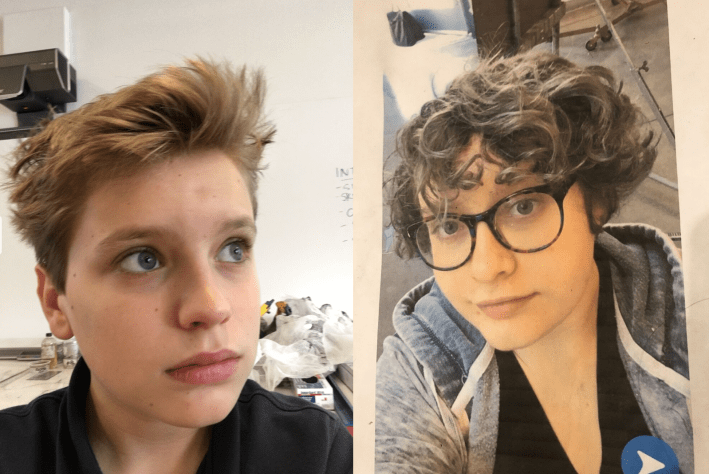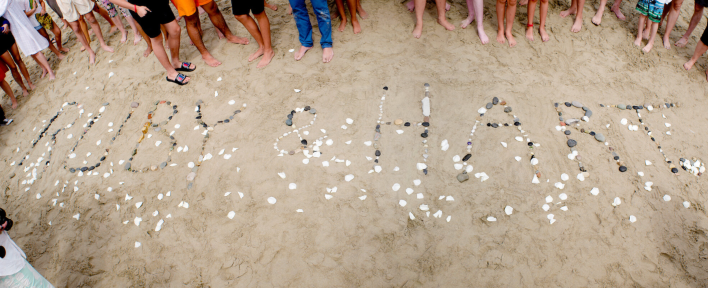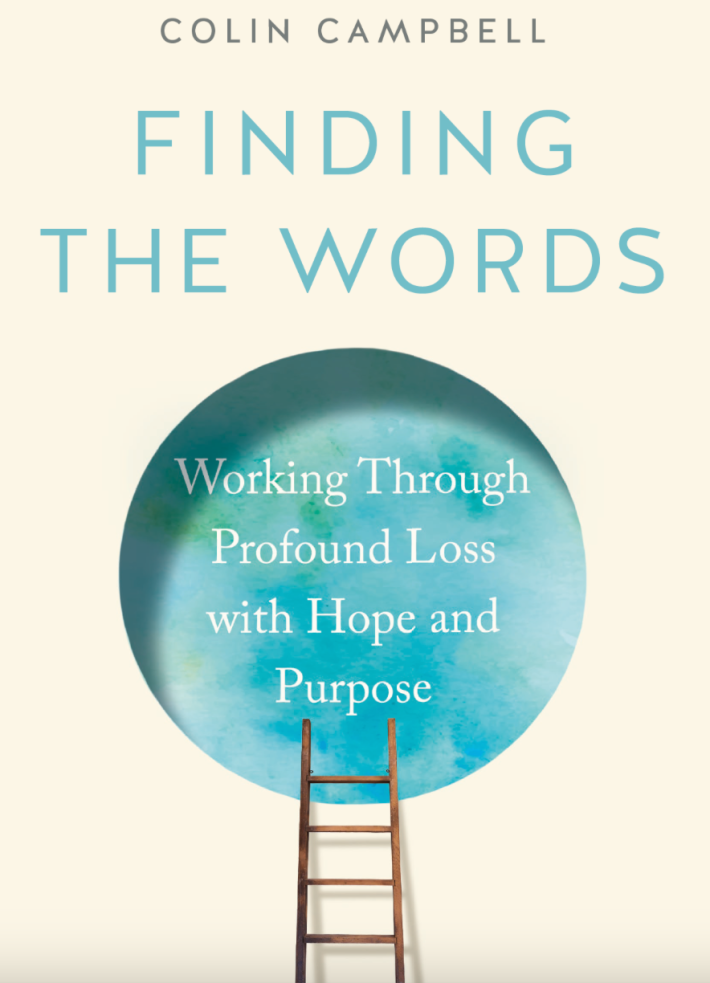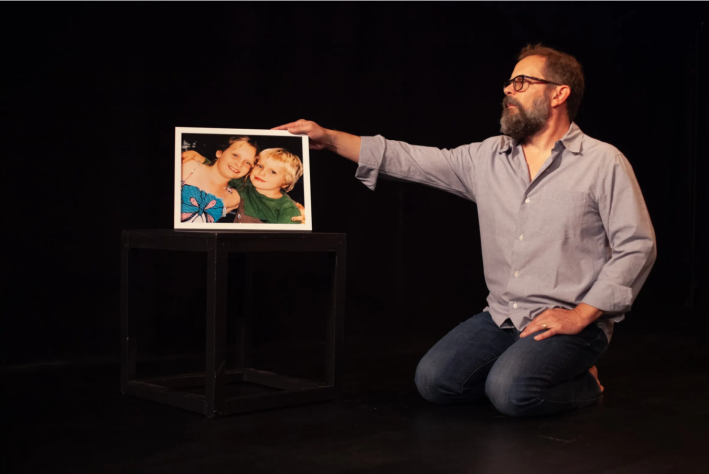On a June night in 2019, filmmaker Colin Campbell and his writer and director wife Gail Lerner were driving on a quiet highway near Joshua Tree. Turning into a gas station, Campbell's car was T-boned by a drunk driver traveling 90 miles an hour. Campbell and Lerner were severely injured; theirchildren, Hart, 14, and Ruby, 17, died instantly.
After their children’s death, the Campbells struggled to find the support they needed; friends, for example, didn't know how to speak to them about their loss, saying only, "There are no words.”
So Campbell decided to make it his mission to find the words that grievers need to hear — and the words that friends and family need to say. The result is a new play, “Grief: A One Man Shitshow,” that Campbell will performing at the People’s Forum in New York City (and streaming free online on Oct. 4. The play and the corresponding book, “Finding the Words: Working Through Profound Loss With Hope and Purpose,” channel Campbell's rage over his children’s senseless deaths into an exploration of the dark thoughts that no one wants to acknowledge.
He talked with Streetsblog in advance of the show's opening. The interview below has been edited for clarity and length.
Jack Teague: What do you want the world to know about Hart and Ruby?
Colin Campbell: Ruby was working on a comic — she was this amazing budding artist at age 17, and she was making this amazing digital comic that was exploring her suicidality and OCD that she was just coming out of. She finished the last touch on the car ride, which was her note to the reader. It said, “If this comic hits too close to home and you’re feeling the same kind of feelings, please seek help. Please call a suicide hotline. I’m in a much better place now than when I was.” She drew a little face, and shortly after she finished the last page of her comic, she was killed.

At the same time, Hart was in the backseat texting Ruby, asking for dating advice about whether he should get back together with an ex-girlfriend who was now flirting with him. This sweet little brother sister exchange was the last thing that they did. It just gives you a feeling for their character and their love for each other.
JT: Tell me more about what you want readers and play-goers to take away from your work.
CC: Our culture doesn’t teach us how to support those in grief. Out of fear, or ignorance, or discomfort, friends and family decide that those most in need want to be left alone. So many people that we’ve met in grief groups have given up on many of their friends and family because they were abandoned. [They] hold so much anger towards those who used to be closest to them. It seemed so sad to me.
One of my focuses in my book is to provide tools for the grievers, specifically to help them find their own words so that they’re able to express their needs to their community. There’s such a strange cultural force that tells us not to ask for what we need.

And yet, I think people who love somebody who is in grief want that instruction. They want [someone] to tell them, ‘What do I say to these people? How do I behave around them?’ The griever is the one who knows how they want to be supported. A big focus of my book is helping the griever find their own words, so that they can share their needs.
JT: What did you most want to hear from your community after your loss?
CC: I love hearing stories about Ruby and Hart. Or how much grief and loss they feel, because then I’m not grieving alone. We’re all missing them. Isn’t that beautiful, to share that loss, rather than my being all alone and feeling like the world has forgotten them?

JT: Why did you want to go to what you call those “dark and ugly places”?
CC: In the play, I go to ugly places where I start comparing loss and comparing different ways that kids can die and I get in the weeds. I do go on this journey, and I become more aware of the profundity of other people’s grief — that I’m not so special, and that there are deeper levels of grief than I’d ever thought of. [But] it goes to a place of grace at the end.
I’ve been told afterwards by audience members that those dark, ugly thoughts were really helpful to them because they’d had them too. I’ve since come to value those dark thoughts more than I initially did. Audiences value hearing someone go through that mental journey and come out on the other side. It’s a cathartic process.
There’s also this shared magic quality of live theater. The audience is together, and I make space for their grief, and they just sit stock still, in silence. It’s powerful, and that only happens in live theater when we’re all in a room in a collective experience.

JT: Are you comfortable talking about the case against the driver? Is it ongoing?
CC: She was arrested three years ago, and the police spent a year building an airtight case with crash analysis, cameras, brake analyses, the crash site. Then she was formally charged with two counts of second-degree murder. The defense attorney has been granted as much time as they want to prepare the case, so it’s ongoing. Either way, she’s in jail, so that doesn’t bother me.
I’ve seen other parents who lost children to drunk drivers agonize over all of the court hearings, and delays, and continuances, and there’s a lot of suffering in that. Our strategy, conscious or not, has been not to think about it too much.
JT: What do you think would be justice for Hart and Ruby?
CC: That’s a hard question for me. Gail and I worked with kids 15 to 17 years old in juvenile hall who were charged with murder, or armed robbery, so they had very long prison sentences. We had a lot of compassion for these kids, and didn’t feel like the prison industrial complex was a great place to put them. But now we’re on the other side, and we’re the victims of someone’s crime.
The thought of her being behind bars instead of out on the roads is comforting. However, if she were to devote her life to fighting drunk driving, that would feel like justice to me.
“Grief: A One Man Shitshow,” Oct. 4, 6:30 p.m., the People’s Forum (320 West 37th Street, between Eighth and Ninth Aves.). Tickets, $5. For tickets or to register for the free livestream, click here. This event is sponsored by Evermore and Families for Safe Streets. “Finding the Words: Working Through Profound Loss With Hope and Purpose” is available wherever books are sold.






